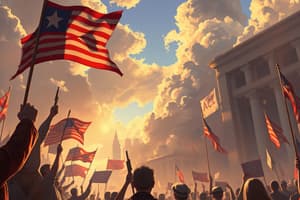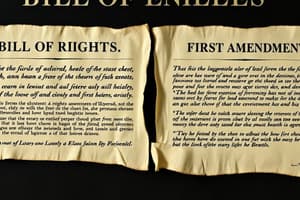Podcast
Questions and Answers
What does the Bill of Rights protect?
What does the Bill of Rights protect?
- Civil liberties without government interference (correct)
- The right to bear arms
- Privacy rights
- Freedom to vote
The five freedoms under the First Amendment are ______, assembly, petition, speech, and press.
The five freedoms under the First Amendment are ______, assembly, petition, speech, and press.
religion
What is the freedom of religion?
What is the freedom of religion?
Congress may not establish an official religion or treat people differently because of their beliefs.
What is freedom of assembly?
What is freedom of assembly?
What is meant by the freedom to petition?
What is meant by the freedom to petition?
What is censorship?
What is censorship?
The First Amendment has no limits.
The First Amendment has no limits.
What is slander?
What is slander?
What is libel?
What is libel?
What was the outcome of Schenck v. United States?
What was the outcome of Schenck v. United States?
What did Brandenburg v. Ohio clarify?
What did Brandenburg v. Ohio clarify?
What does the Fourth Amendment protect against?
What does the Fourth Amendment protect against?
What is a search warrant?
What is a search warrant?
What does the Fifth Amendment state about indictments?
What does the Fifth Amendment state about indictments?
What does double jeopardy mean?
What does double jeopardy mean?
What is due process?
What is due process?
What does the Eighth Amendment forbid?
What does the Eighth Amendment forbid?
What is the Establishment Clause?
What is the Establishment Clause?
What is the Lemon Test?
What is the Lemon Test?
Flashcards are hidden until you start studying
Study Notes
First Amendment Freedoms
- The Bill of Rights safeguards civil liberties, allowing individuals to think and act freely without government interference.
- Five fundamental freedoms protected by the First Amendment: religion, assembly, petition, speech, and press.
Freedom of Religion
- Congress cannot establish an official religion or show favoritism towards any religion.
- Individuals cannot be discriminated against based on their religious beliefs.
Freedom of Assembly
- Citizens have the right to gather peacefully in public spaces for any purpose.
- Governments can regulate assembly but cannot outright ban it.
Freedom to Petition
- Individuals have the right to express grievances and request actions from the government.
- This includes writing to elected officials to present ideas or complaints.
Freedom of Speech
- Individuals can express opinions about the government without fear of punishment, including unpopular views.
- This freedom extends beyond spoken words to include film, radio, and clothing.
Freedom of the Press
- Citizens can freely express themselves through print and online media.
- Government censorship is prohibited, ensuring no prior restraint on publication.
Censorship
- Censorship refers to banning material before it is published, which is restricted under the First Amendment.
Limits to First Amendment
- First Amendment rights have limitations for safety, security, rights of others, and the prohibition of false statements.
Slander and Libel
- Slander involves making false spoken statements about someone knowingly.
- Libel involves making false written statements about someone knowingly.
Key Court Cases
- Schenck v. United States: Established that free speech can be restricted if it presents a "clear and present danger."
- Brandenburg v. Ohio: Expanded protections under the First Amendment, allowing speech unless intended to incite violence or lawless actions.
Rights of the Accused
- Amendments 4, 5, 6, and 8 comprise protections for individuals accused of crimes.
Fourth Amendment
- Protects citizens from unreasonable searches and seizures, requiring search warrants to be issued based on probable cause.
Search Warrant
- A legal document that authorizes law enforcement to search a property and collect evidence.
Fifth Amendment
- Ensures that no one can be tried for serious federal crimes without an indictment.
- Protects individuals from being tried twice for the same crime (double jeopardy).
- Guarantees the right to remain silent, preventing self-incrimination.
- Provides due process rights for life, liberty, and property protection.
Due Process
- Refers to the legal procedures established to safeguard individuals' rights during legal proceedings.
Eminent Domain
- The government's right to take private property for public use, provided just compensation is offered.
Sixth Amendment
- Guarantees a speedy and public trial with an impartial jury, the right to legal representation, cross-examination, and the ability to call witnesses.
Eighth Amendment
- Prohibits excessive bail, excessive fines, and cruel and unusual punishment.
Bail
- A security deposit ensuring that an accused individual returns for trial proceedings.
Establishment Clause
- Part of the First Amendment that prohibits Congress from establishing a state-sponsored religion.
Lemon Test
- A legal standard from Lemon v. Kurtzman, which states:
- Law must have a secular purpose.
- Effect of the law must neither inhibit nor advance religion.
- There should be no excessive entanglement with religion.
Studying That Suits You
Use AI to generate personalized quizzes and flashcards to suit your learning preferences.




